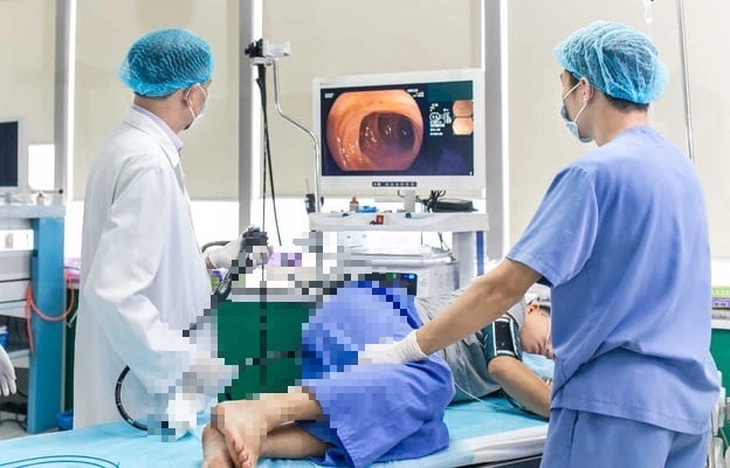Endoscopy is the gold standard in diagnosing colorectal cancer - Photo: BVCC
Associate Professor, Dr. Pham Cam Phuong - Director of the Center for Nuclear Medicine and Oncology, Bach Mai Hospital - affirmed that early detection through regular screening can help increase the cure rate of colorectal cancer to over 90%.
Why early detection of colorectal cancer?
According to data from GLOBOCAN 2022, colorectal cancer (CRC) ranks 3rd in the number of new cases and 2nd in the mortality rate from cancer worldwide, with a rapidly increasing and rejuvenating trend.
In Vietnam, according to GLOBOCAN 2022, there are approximately 16,835 new cases and more than 8,454 deaths each year. Worryingly, 20-30% of patients are diagnosed at a stage of distant metastasis, making treatment complicated.
However, if detected early, the 5-year survival rate can be over 90%.
According to Dr. Phuong, gastrointestinal cancer is formed from gastrointestinal polyps, a process that lasts 10-15 years. If polyps are removed early, the risk of cancer is reduced by 90%.
Accordingly, colorectal polyps are like "seeds" of cancer. When they are small, removing polyps through endoscopy is very simple and effective. However, if polyps develop into malignant tumors, the treatment process will be complicated, expensive and the risk of complications is much higher.
"It is noteworthy that colorectal cancer is getting younger. Many patients under 40 years old are diagnosed, breaking the notion that "only old people get the disease". Modern lifestyle with a diet high in red meat, low in fiber, lack of exercise, smoking, drinking alcohol... are factors that promote risk," said Dr. Phuong.
Effective screening methods
1. Fecal occult blood test (FIT/FOBT)
This is a simple, non-invasive method that can be done at home. FIT detects microscopic blood in the stool - an early sign of polyps or cancer. If the result is positive, the patient needs a colonoscopy to determine the exact cause.
2. Colonoscopy
According to Dr. Phuong, this is the "gold standard" in diagnosing colorectal cancer. Endoscopy not only detects polyps, but can also remove them during the procedure. Many people are afraid of endoscopy because they are afraid of pain, but with modern anesthesia techniques, the process is gentle and only takes 15-30 minutes.
3. Abdominal CT scan
Suitable for people who cannot undergo colonoscopy due to health or psychological reasons. CT scan creates 3D images of the colon, helping to detect tumors or polyps. However, this method cannot biopsy or remove lesions.
4. Fecal DNA methylation assay
Fecal DNA methylation testing is a noninvasive early screening method for colorectal cancer.
With high sensitivity in detecting early stage cancer and precancerous lesions, this test is considered a suitable alternative for people who do not want or cannot have endoscopy. If the result is positive, the patient needs to have an endoscopy for a definitive diagnosis.
5. SEPTIN9 gene methylation test
The SEPTIN9 gene is used for early detection of colorectal cancer through a blood test. The test can find traces of cancer in the blood without the need for a colonoscopy.
This method is simple, minimally invasive and suitable for people who do not want or cannot undergo endoscopy.
Although the sensitivity and specificity of this test are not superior to endoscopy, it is still a valuable adjunct in colorectal cancer screening, especially in the group at average risk of colorectal cancer.
6. Tumor marker testing
Tumor markers such as CEA and CA 19-9 are used to monitor recurrence and response to treatment. Elevated CEA is associated with poor prognosis, but is not used for screening. When combined with other methods, it helps evaluate treatment effectiveness and detect early recurrence.
Who needs screening and when should it start?
Dr. Phuong recommends that people aged 45 and over, even if they have no symptoms, should have a FIT every year and an endoscopy every 10 years if the endoscopy shows no abnormalities. If there are abnormalities, the second and third endoscopy appointments will be scheduled as directed by the doctor.
In addition, people with a family history of colorectal cancer should start screening 10 years earlier than their relatives' age of diagnosis (usually 35-40 years old). People with polyps or chronic inflammatory bowel disease should be screened every 1-3 years depending on the severity.
"You should not wait until you have symptoms such as abdominal pain, bloody stools, or weight loss to go see a doctor. By then, the disease may have progressed severely," Dr. Phuong warned.
Dr. Phuong also recommends that to prevent the disease, each person should maintain a diet rich in fiber, limit red meat and processed foods; exercise 30 minutes/day to stimulate intestinal motility; avoid tobacco and alcohol; and adhere to a screening schedule based on risk groups.
WILLOW
Source: https://tuoitre.vn/ung-thu-dai-truc-trang-tre-hoa-ai-nen-tam-soat-20250611093950607.htm

































































































Comment (0)